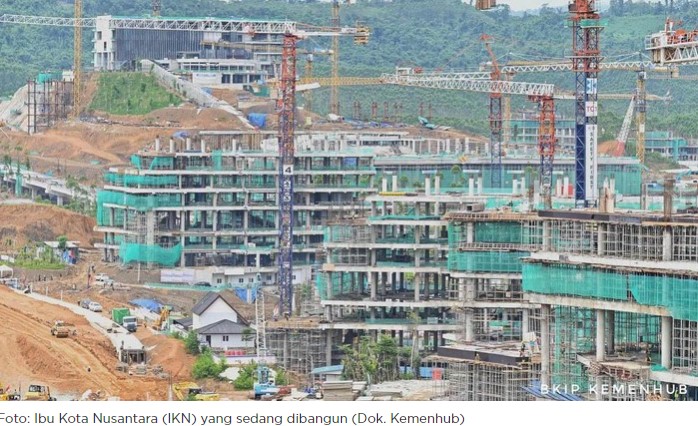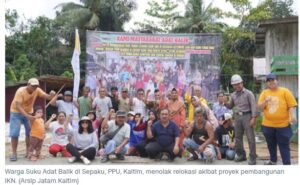
STRATEGIC ASSESSMENT. Government estimates show that Jakarta will need approximately Rp 561 trillion (around $34.8 billion) in infrastructure funding to become a global city, especially after it loses its capital city status.
The government is seeking to move the capital from Jakarta to a future city called Nusantara in East Kalimantan. Despite the capital relocation, President Joko “Jokowi” Widodo wants Jakarta’s developments to still remain a priority and turn it into a global city, according to the National Development Agency (Bappenas). However, that dream calls for huge funding.
“The government will continue to develop Jakarta as a business city, financial city, trade center, and the services center that are of regional and global level,” Abdul Malik Sadat, a director at Bappenas, told a group discussion at B-Universe’s headquarters in PIK 2.
The Central Statistics Agency (BPS) said Tuesday that there had been a change in migration patterns among Indonesians, as they look to settle outside the populous Java Island.
Java is more developed and populous than other regions in the archipelago, making it a popular choice among Indonesians as a place to look for jobs or settle in. But according to BPS, more Indonesians are moving to other islands such as Sulawesi and Kalimantan — which is home to the country’s future capital Nusantara. BPS attributed the shift in migration to the government’s developments. The government’s plan to move the capital from Jakarta to Nusantara is also expected to drive more people to Kalimantan.
Coordinating Minister for Economic Affairs Airlangga Hartarto met with Singapore’s Foreign Affairs Minister Vivian Balakrishnan in Jakarta on Tuesday, April 23, to prepare for the Leaders’ Retreat between President Joko “Jokowi” Widodo and Singapore Prime Minister on April 29, 2024.
This collaboration includes the field of green energy, particularly solar farms, carbon capture storage, Batam-Bintan-Karimun development, digital connectivity, and data centers. Airlangga said that many data centers will be built in the State Capital or Nusantara (IKN). These aim to bolster the development of IKN which carries modern concepts and digitalization.
Several domestic and international companies have shown interest in developing the electric vehicle (EV) ecosystem in Nusantara, Indonesia’s new capital city in Kalimantan, to realise its vision of a smart and green city, government officials said.
The United Nation’s definition of a developing country is, “a country with a relatively low standard of living, underdeveloped industrial base, and moderate to low Human Development Index (HDI)”. This definition in itself calls for decisive, bold and out-o-the-box thinking and actions to be undertaken by able leaders of these economies in order to catalyse changes to benefit future generations to come.
More often than not, these actions create a conundrum that could impact various concerns, including that of displacement of societies, environment or the ecology while pursuing economic gains, improvement of human development standards, administrative cohesiveness or even safeguarding the sovereignty of the nation in question. It is a fine balance that has to be struck by duly elected leadership of these countries in order to drive their nation to its next level of development.

Foreign Affairs Minister Retno Marsudi has revealed that the Indonesian and Singapore Leaders’ Retreat at the Bogor Palace on April 29 would discuss development in the capital (IKN) Nusantara in East Kalimantan.
Indonesian President Joko Widodo (Jokowi) and Singaporean Prime Minister Lee Hsien Loong will later hold a meeting to discuss a plethora of issues, including food security, energy transition, and IKN development, she said.
The discussion will also cover the development of human resources and improvement of skills, talent exchange in the digital sector, and increasing capacity in the health sector, according to her.
The shifting of the capital city (or Ibu Kota Negara, IKN) from Jakarta in Java island to Nusantara in Kalimantan island in Borneo is not a surprise; however, only this time it materialised. The capital relocation is urgent due to critical factors, including the climate crisis, Jakarta’s vulnerabilities, regional development disparity, and Indonesia’s regional and global aspirations.

The political leadership’s desire to take on the challenges of climate events ahead of significant calamities and development concerns is visible in different political eras–Sukarno, Suharto, and Susilo Bambang Yudhoyono.
We need to look into what ails Jakarta and why Nusantara was chosen as the new capital city. Jakarta is home to about 56% of the country’s total population, with 152 million people living in the city, according to the 2020 census.





